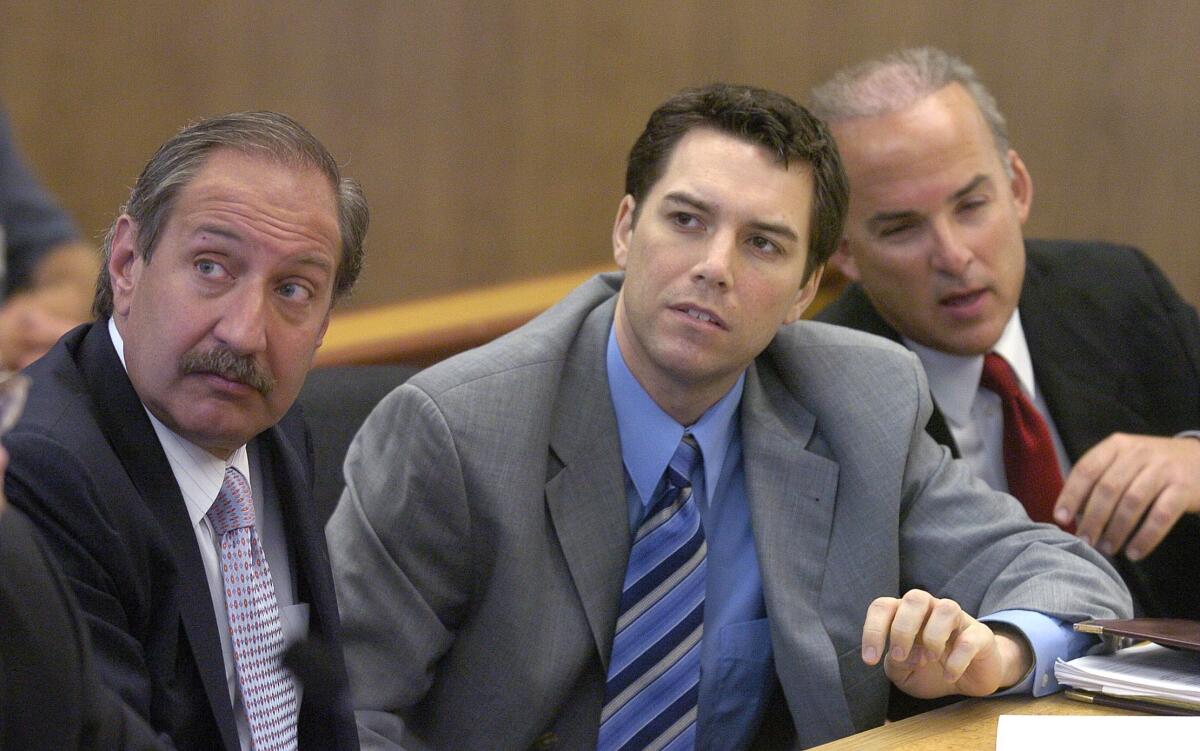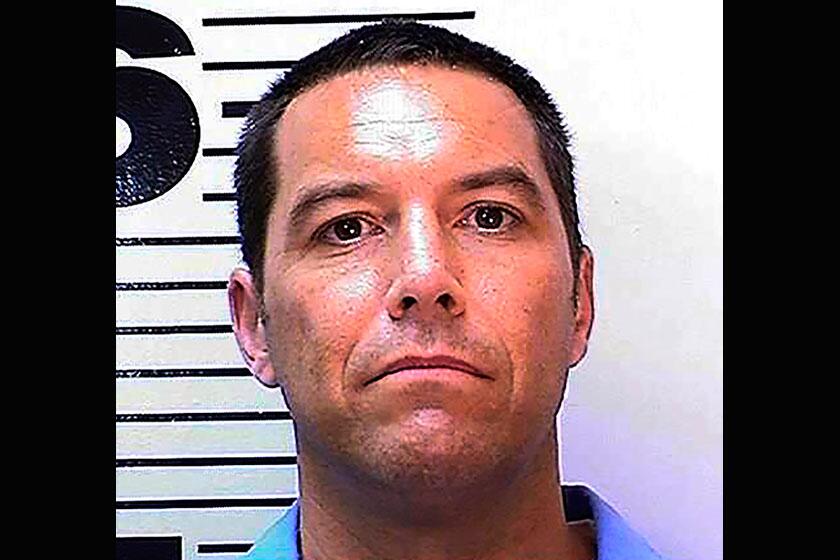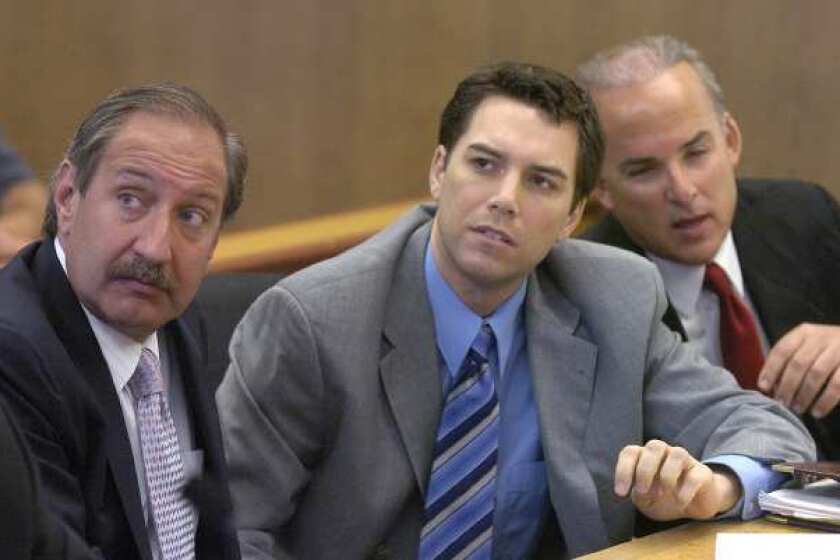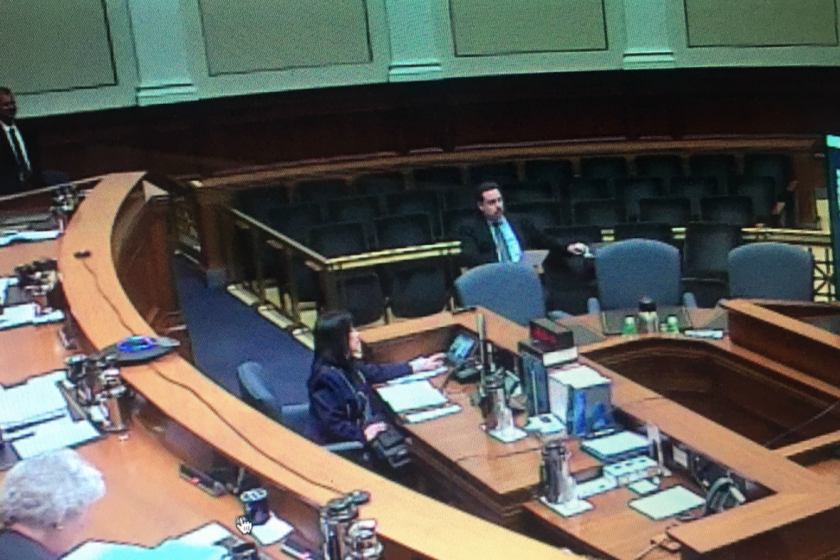Scott Peterson re-sentenced to life term in Laci Peterson’s 2002 death

SACRAMENTO — Nearly 17 years after being sentenced to die, Scott Peterson was re-sentenced to life without parole Wednesday during an emotional hearing in which family members of his slain pregnant wife, Laci, called him out for the killing in 2002 and his apparent lack of remorse.
“I still feel the grief every day, after 19 years,” said her mother, Sharon Rocha. “Your evil, self-centered, unforgiveable selfish act ended two beautiful souls. And for what reason? There was no reason other than that you just didn’t want them anymore. You didn’t want a baby nor the responsibility of being a father. You’re a coward.”
“I have dreams about her,” she added about her daughter, who was 27 and eight months pregnant when she was killed carrying the boy the couple planned to name Connor. “And sometimes when I wake up, I cry because they’re so realistic and I know I’ll never see her again.”
Laci Peterson’s brother and sister, Brent Rocha and Amy Rocha, added their own emotional comments during the hearing.
The California Supreme Court ruled a year ago that his jury was improperly screened for bias against the death penalty. Stanislaus County Dist. Atty. Birgit Fladager, who rose to fame as one of three prosecutors in Peterson’s trial, opted this time to settle for life without parole.
Peterson’s attorney, Pat Harris, said his client has shown no remorse because he’s not guilty. He said, as he has in the past, that the defense can now prove that burglars were nearby on the day Laci disappeared — though investigators say they were ruled out as suspects.
In Paul Flores’ hearing in the Kristin Smart case, defense attorneys point to Scott Peterson and others as potential suspects.
Peterson was uniformly described as a loving husband and expectant father, Harris said, until it became public that he was having an affair at the time of his wife’s disappearance.
Then “he quickly became the most hated man in America,” Harris said, with a billboard outside the courtroom asking if he was a “man or monster.”
Peterson was prepared to speak, something he didn’t do during his initial trial and sentencing, Harris said, but Superior Court Judge Anne-Christine Massullo didn’t allow it.
Peterson’s supporters were in the courtroom, but they were not allowed to speak.
Massullo re-sentenced Peterson without adding her own significant comment. She is separately considering whether Peterson was prejudiced by juror misconduct.
But she opted to re-sentence Peterson first, over the objections of his lawyers, to resolve a problem with his status.
He had been in San Quentin State Prison, home to California’s death row, since he was condemned to death in March 2005. That followed his conviction in November 2004 during a trial that was moved 90 miles to San Mateo County because of worldwide publicity.
But Massullo said he couldn’t stay on death row once prosecutors said they would not again seek his execution. He was moved to the county jail for re-sentencing and is expected to remain there until Massullo decides on whether he should get a new trial.
Inmates, including some on death row, are receiving unemployment benefits in what D.A.s call ‘the most significant fraud on taxpayer funds in California history.’
She plans about a weeklong hearing from Feb. 25 through March 4 to hear defense claims that the woman known as Juror 7 falsely answered questions during the selection process.
They say she actively sought to join the jury and later co-authored a book on the case. Richelle Nice has not been named in court papers but co-authored the book with six other jurors.
Defense lawyers contend she was biased because she had been a crime victim, which she did not disclose during jury selection. They learned only later that she had been beaten by a boyfriend in 2001 while she was pregnant. She obtained a restraining order during another pregnancy against a boyfriend’s ex-girlfriend because she was fearful the woman would harm her unborn child.
Nice said in a court filing that she didn’t think the restraining order was a lawsuit that she had to disclose on her jury form, nor did she “feel ‘victimized’ the way the law might define that term.”
Massullo will have 90 days after next year’s hearing to decide whether Peterson should get a new trial.
Prosecutors say Peterson took his wife’s body from their Modesto home on Christmas Eve 2002 and dumped her from his fishing boat into the San Francisco Bay, where the remains washed ashore in April 2003.
Despite an entreaty from Gov. Gavin Newsom, the California Supreme Court has refused to overturn hundreds, if not all, death sentences in the state.
Supreme Court justices said in their August 2020 decision overturning his death sentence that there was considerable circumstantial evidence incriminating Peterson in the first-degree murder of Laci and the second-degree murder of Connor.
It included that the bodies washed ashore near where Peterson admitted he was fishing on the day they disappeared. He had researched ocean currents, bought a boat without telling anyone, and couldn’t explain what type of fish he was trying to catch that day.
Also, in the weeks after Laci disappeared but before the bodies washed ashore, he sold his wife’s car, looked into selling their house, and turned the baby nursery into a storage room.
Peterson was eventually arrested after Amber Frey, a massage therapist living in Fresno, told police that they had begun dating a month before his wife’s death, but that he had told her his wife was dead.
More to Read
Sign up for Essential California
The most important California stories and recommendations in your inbox every morning.
You may occasionally receive promotional content from the Los Angeles Times.












